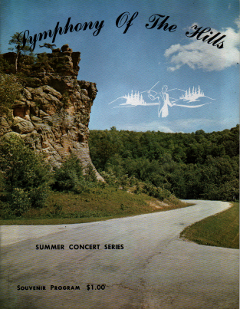
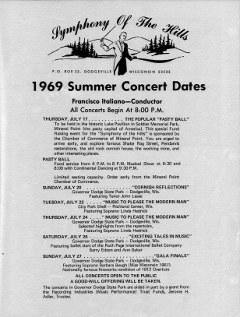
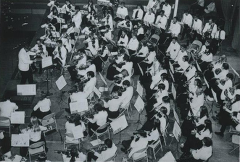
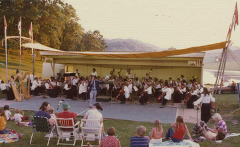
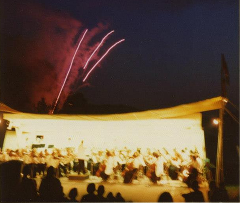
When I was in high school, I spent five weeks of each summer ('69, '70, '71) at a training camp for students aspiring to become players in a symphony orchestra. We spent two weeks in Dodgeville (where we were known as the "Symphony of the Hills") and three in La Crosse ("Great River Symphony"). The idea was that players from symphonies around the country held the first desk positions, and guided the students to learn the repertoire. We had teachers from the orchestras in Baltimore, Kansas City, Houston, Dallas, and Atlanta, among others. In the case of the wind and brass sections, there were sometimes quite a few players on stage, with each student getting a chance to play some of the solo parts. According to a rehearsal schedule I still have, six hours of rehearsal a day wasn't uncommon.
While much of the repertoire was what can charitably be called "light classics" (I remember playing the Grand Canyon Suite and the incidental music from Victory at Sea, and we played Strauss waltzes and polkas at the Pasty Ball in Mineral Point), there were also concerts where we played more ambitious repertoire, like Charles Ives' Variations on America and Stravinsky's Firebird suite. Part of the school's mission was to bring classical music to people who lived away from big cities, and we spent a lot of time on buses riding out to small towns in western Wisconsin, where we occasionally played in bandshells with the honking of car horns for applause. Of course, the highlight of the two weeks in Dodgeville was a concert at Governor Dodge State Park which ended with our "nationally famous fireworks rendition" of Tchaikovsky's 1812 Overture. We played on a hill overlooking the lake, and on the beach were trained pyrotechnicians armed with enough fireworks to shift the Earth on its axis. One of the percussionists had a cue marked in his part to shine a flashlight down to the beach, at which point all hell broke loose. I distinctly remember a lovely Swiss violinist named Bettina Lauterburg telling us in a sectional rehearsal "...and from letter 'S' to the end you don't have to practice because you won't be heard anyway".
But the best concerts were those held in a more traditional concert setting, and some of my copies of recordings from those days still exist. Although the sound quality leaves something to be desired, the playing is surprisingly good, considering that most of the players were high school students. Those of us who were there will never forget the experience of Maestro Italiano's emotionally charged interpretations.
These pieces are from a concert in 1970 in La Crosse:
Prélude à l'après-midi d'un faune (Prelude to the Afternoon of a Faun), Claude Debussy
Pini di Roma (The Pines of Rome), Ottorino Respighi
These pieces are from a string orchestra concert, also in 1970 in La Crosse:
Crisantemi (Chrysanthemums), Giacomo Puccini
Serenade for Strings, Josef Suk
Adagietto from Symphony No. 5, Gustav Mahler
* A note about this recording of The Pines of Rome: Respighi's score calls for a recording ("grammofono") of the song of a nightingale near the end of the Pines of the Janiculum, but no matter what we tried, it just didn't sound right. Finally, a young man in the viola section volunteered to whistle it himself. Maestro Italiano demurred at first, until we heard him try it... and it sounded just like a bird! So when we came to that part in the score, Maestro cued him, and he discreetly warbled away, faithfully re-creating Respighi's nightingale. I doubt that anyone in the audience noticed.